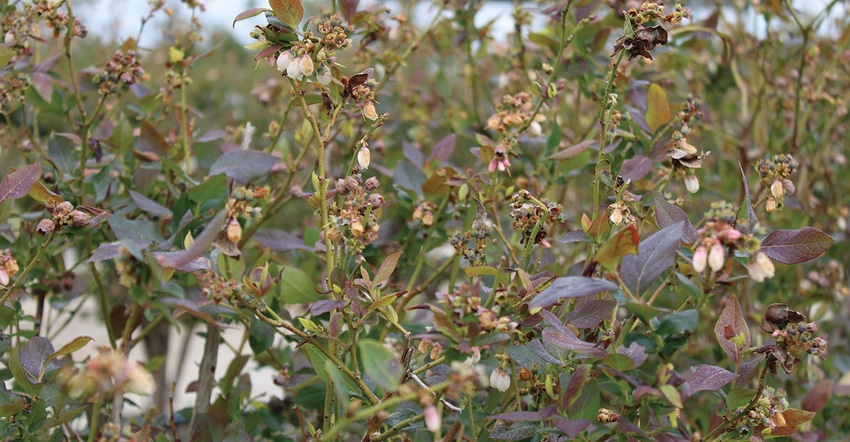
Farmers and agriculture officials continue to assess the damage to Georgia’s 2022 blueberry crop, but the consensus is that the March 12-13 freeze wiped out much of the crop. Temperatures were too cold for too long, officials said.
Zilfina Rubio Ames, assistant horticulture professor and small fruit Extension specialist with the University of Georgia, said freeze damage takes a while to develop. She said the damage is widespread across the state, especially in the prime blueberry growing region in the southeast.
“Some varieties already had fruit, and some were flowering,” Ames said. “Some of the farmers that had overhead irrigation were protected.”
Ames told Farm Press on April 8 that the damage is still being assessed.
Similar late freezes devastated the state’s blueberry crop in 2017 and 2018. The crop rebounded in 2019 to ranking among the top three states with 17% of U.S. production, according to the USDA. That momentum continued in 2020 when the state’s crop was valued at more than $304 million.
Malcolm McCoy, partner and manager of Major League Blueberries, the state’s largest organic blueberry farm in Nicholls in Coffee County, anticipated a strong crop prior to the freeze. However, he said his crop is lost. He estimated 75% of the state’s crop was wiped out.
“It got so cold here,” McCoy said. “We were out assessing the damage with the USDA and our crop insurance company. We have frost protection here and it will protect down to around 24 or 23 degrees, but it got down to 21 or 20 here and we couldn’t protect it. That’s why you have crop insurance. We probably will not have a harvest this year. Our entire farm is protected, but you can only go down to a certain level and after that it’s cooked.”
Just to the east of Coffee County lies Bacon County, Georgia�’s leading blueberry-producing county with more than 8,000 acres of blueberries. Bacon’s 2020 crop was valued at $70,686,000, according to University of Georgia Cooperative Extension statistics.
Zack Williams, Extension agent in Coffee County, said damage occurred across the county. He estimated the country has between 120 and 130 blueberry growers.
“The ones without overhead frost protection took a good hit,” Williams said. “Some of the farmers that have protection might have fared better than others. The amount of water that is needed to be put out would have been pretty high, so I don’t know if a lot of our systems were set up for that.”
About the Author(s)
You May Also Like






